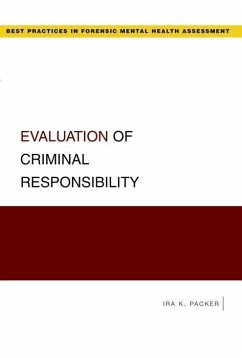Forensic mental health assessment (FMHA) has grown into a specialization informed by research and professional guidelines. This series presents up-to-date information on the most important and frequently conducted forms of FMHA. The 19 topical volumes address best approaches to practice for particular types of evaluation in the criminal, civil and juvenile/family areas. Each volume contains a thorough discussion of the relevant legal and psychological concepts, followed by a step-by-step description of the assessment process from preparing for the evaluation to writing the report and testifying in court. Volumes include the following helpful features: - Boxes that zero in on important information for use in evaluations - Tips for best practice and cautions against common pitfalls - Highlighting of relevant case law and statutes - Separate list of assessment tools for easy reference - Helpful glossary of key terms for the particular topic In making recommendations for best practice, authos consider empirical support, legal relevance, and consistency with ethical and professional standards. These volumes offer invaluable guidance for anyone involved in conducting or using forensic evaluations.
While the notion of insanity and the fact that it is unfair to hold "mentally impaired" people fully and criminally responsible for their actions has a long history, the concepts associated with criminal responsibility are still complex and difficult to define. In recent years, the field has developed a greater consensus regarding essential data collection methods, as well as how to manage the type of reasoning that is required in fitting data to the legal definitions. This volume offers guidance for the forensic mental health examiner, based on tradition as well as the latest developments for improving practice in criminal responsibility evaluations.
Hinweis: Dieser Artikel kann nur an eine deutsche Lieferadresse ausgeliefert werden.
While the notion of insanity and the fact that it is unfair to hold "mentally impaired" people fully and criminally responsible for their actions has a long history, the concepts associated with criminal responsibility are still complex and difficult to define. In recent years, the field has developed a greater consensus regarding essential data collection methods, as well as how to manage the type of reasoning that is required in fitting data to the legal definitions. This volume offers guidance for the forensic mental health examiner, based on tradition as well as the latest developments for improving practice in criminal responsibility evaluations.
Hinweis: Dieser Artikel kann nur an eine deutsche Lieferadresse ausgeliefert werden.








